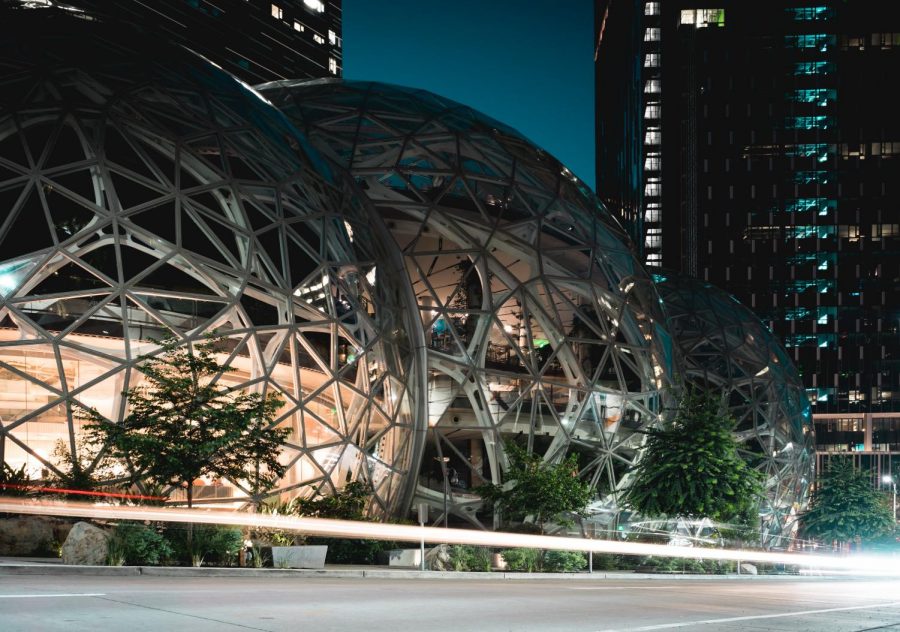Ethical Consumership with Amazon
Amazon is known for its quick delivery – but how does it affect the people working there?
November 25, 2019
In 1994, a man left his job in Wall Street to come to Seattle and capitalize on the Internet business boom. He decided that books were most promising to sell online. Working out of his garage and starting with an investment from his parents, he created a company that has since grown tremendously, earning a net $10.1 billion last year. At first, it was called Cadabra. Now, it’s called Amazon.
A lot else has changed since its early days. Limited to books at its conception, Amazon now sells anything you could think of. Amazon Prime, its subscription service, allows consumers to get next-day delivery on thousands of different items. However, this convenience comes at a cost.
In a survey conducted during one of Amazon’s busiest times, warehouse workers in England divulged important information about how they were treated at work. They described conditions between December 2017 and January 2018 as stressful, unfair, and even terrifying. Several workers complained about their targets increasing past their physical limits, requiring them to pack hundreds of boxes per hour.
Workers are also concerned about how their employer deals with sick days. According to the survey, Amazon uses a point system to keep track of infractions. If an employee reaches a certain number of points, they’re at risk of losing their job. One woman said she got points for being sick during pregnancy, and multiple employees complained about still getting infractions after presenting their boss with a doctor’s note.
Near the end of the survey, employees were asked, “now that you know what working at Amazon is like, would you apply for a job there again?” 81.5% said no, citing the disrespect they felt and the constant fear of losing their jobs due to rising targets.
Conditions like the ones described above are presumed to have caused Billy Foister, a 48-year-old Amazon worker, to die in September of 2019. A few days before his death, a supervisor reprimanded him for putting an item in the wrong box within a few minutes of it happening. That day, however, Foister had a heart attack and didn’t receive any medical help for 20 minutes.
An employee from Foister’s shift recollects that after he was taken to the hospital, their work was to resume as normal, saying, “basically watch a man pass away and then get told to go back to work, everyone, and act like it’s fine.”
Foister’s brother, Edward, points out something eerie: “How can you not see a 6 ft 3 in man laying on the ground and not help him within 20 minutes? … Within two minutes management saw [the misplaced item] on camera and came down to talk to him about it.” Edward also says that Foister was complaining of chest pains earlier that week. He was sent to the facility’s medical clinic, where they told him he was dehydrated, gave him some beverages, and sent him back to work. Amazon still claims Foister didn’t die at work, and that his death was related to a “personal medical issue,” but according to Edward? “If [Amazon] did their job right, I wouldn’t have had to bury my little brother.”
Another red flag for Amazon is its position on a list called the Dirty Dozen. The list is released every year by the National Council for Occupational Safety and Health, or COSH, detailing the top 12 most dangerous employers from that year. This year, Amazon got on that list for the second year in a row. COSH attributes this to recent investigations uncovering high incidences of suicide attempts, workers urinating in bottles to avoid using too much of their break, and workers with no income after on-the-job injuries.
For example, take the story of Vickie Shannon Allen, former Amazon warehouse worker. A machine she had to use lacked proper guarding, which gave her an injury. She went to a company doctor and was promptly dropped as a patient. She turned down a $3,500 settlement requiring her to not speak about the injury, and due to the lost income, had to live in her car in the parking lot of the warehouse.
Stories like these show what goes on behind closed doors in Amazon warehouses. Convenience and speed is important as a consumer, but the unethical treatment of employees is something no one can ignore, Prime member or otherwise. This holiday season, maybe think twice about ordering gifts online.



